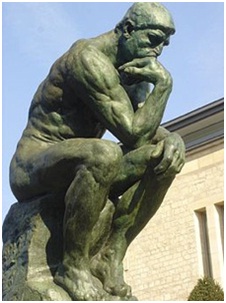Guest Blog: A Glimpse of the Future
Published by: WCET | 7/6/2011
Tags: WCET Annual Meeting
Published by: WCET | 7/6/2011
Tags: WCET Annual Meeting
Myk Garn, SREB, and Hae Okimoto, University of Hawaii, have been thinking up an exciting new addition to the WCET Annual Conference. We asked them to share their idea with you.
The future is relatively hard to predict. But, future possibilities are easy to imagine.
Knowing what we should do (or not do) today to be successful tomorrow is hard…and high risk. If you predict (okay, guess) wrong…and commit too many resources you could lose. If you guess right, and commit too few resources…you may not be able to capitalize on your prescience. Getting the balance right makes all the difference. Let’s examine some heuristics that could help achieve this balance.
First, you cannot predict the future.
Maybe Nostradamus can – but you can’t. You are more like a weather woman. You can read the data, watch what’s happening next door, run simulations, make WAGs and SWAGs and BHAGS and SWOT the future to death…all acceptable – but all more or less varying levels of educated guessing.
Second, imagining the future is easy.

Conversely to predicting – imagining a particular scenario, based on a specific combination of trends, possible events, and addressing the uncertainties – is relatively straightforward. Of course it is only one of innumerable possible futures – most no more likely than the other. But some scenarios are more relevant, possible, and informative than others. By constructing a set of several “most likely” scenarios – we can begin to “bound” the path of the future. We’re not predicting it – but we are imagining, in an “if this – then this,” way, a set of strategic directions and options that can compromise a relatively robust and useful set of plans and responses for the future.
Third, most of us don’t have the time to do this.
We spend every day deep in the swamp with the alligators wrestling with the hot-button issue of the day – but we rarely get the time to explore, reflect, and construct well-informed navigational plans for the future. We just jump from gator to gator as fast as we can.
Fourth, it always seems like we are missing pieces of the puzzle.
The future sort of looks like yesterday if we don’t step back a bit. Getting a broader view of the complexity, and using different lenses to frame our contexts, is hard to achieve – even in a caffeine-fueled frenzy at a Starbucks (as Myk is known for writing at). We need more people. People who understand our challenges and people who do not. People who are as directly related and deeply involved as we are – and people who see things very differently and maybe (dare we admit it) more objectively.
Fifth, there will be chaos.
Imaging the future, especially in the company of like-challenged practitioners, is enervating. It is fun – and cool. But it is also highly fragmented, to begin with. Bringing multiple issues, varying needs, disparate contexts and communities, unresolved uncertainties, and just plain off-the-wall thinking into focus is not for beginners (or, maybe, they are uniquely suited to contribute as well).
Finally, we will need to wear shades. Indeed, everyone is an expert of their own chaos.
It is in exactly the same manner in which reverse sine-waves (DO NOT ask me how that works) from two microphones are used to cancel out background noise – that bringing multiple experts and practitioners together can result in a brilliantly insightful, informative – and useful set of strategic planning outcomes.
Join us at the “Forging the Future” FutureShop
If you agree with these contentions – you should consider joining a gaggle of similarly inclined colleagues at the “Forging the Future” FutureShop session on Wednesday, October 26, 2011 at the WCET Annual Conference. If you disagree with these hypotheses, you should consider joining the pod (max of 40 so don’t miss out) of mis-informed colleagues gathering at “Forging the Future” to point us in another direction. Be there, or be left wondering when you’ll have time to plan for the future. Visit the Forging the Future webpage for full details and more about why you should register and attend.


“Thinking Man” Photo credit: Some rights reserved by mrmayo
3 replies on “Guest Blog: A Glimpse of the Future”
For more future thinking, please visit Virginia Tech’s blog site featuring its 2011 Report of the Task Force on Instructional Technology:
http://blogs.is.vt.edu/inventthefuture2020
Clever to substitute”imagining” for predicting and I think you have something there. I do not plan to attend this years conference but would like to be included in the discussion…can we do this?
Fran, we are going to miss you at this year’s conference. At this time the workshop is intended to be in-person and interactive but I will keep this in mind for future “future workshops.”